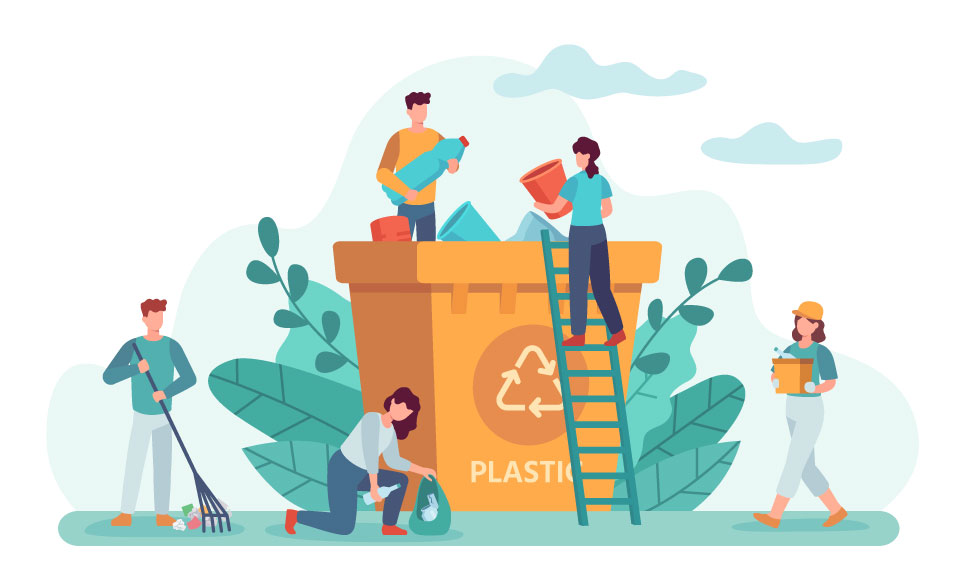Swiss households produce 9 billion pieces of plastic waste per year

The national campaign, The Big Plastic Count, has published its results. According to the results, food and beverage packaging accounts for the largest proportion of plastic waste counted.
The national campaign The Big Plastic Count was organized by the Gallifrey Foundation, Greenpeace Switzerland and Earth Action for Impact. The aim of the campaign was to measure the consumption of plastic waste in Swiss households and gather feedback from the participants. Earth Action for Impact chose a combination of quantitative and qualitative approaches using its own database Plasteax. A total of 4,498 households and 595 students participated, making a total of 11,586 people. Food and beverage packaging accounts for the largest part of the plastic waste counted. Providing plastic-free alternatives is the primary duty of brand manufacturers and retailers, according to 91% of respondents.
Recycling rate is below 0.01%
In one week, participants threw away 215,463 pieces of plastic waste – about 2.7 pieces per person per day. Extrapolated to the population as a whole, this adds up to almost 9 billion pieces of plastic waste per year. By far the most common category of plastic is “food and beverages” (83%), followed by “cleaning and hygiene articles” (8%) and “other” (e.g. bubble wrap) (9%). The most frequently discarded plastic items often come into direct contact with food. Soft plastics for food and beverages alone account for 46% of all plastic waste counted. The recycling rate is less than 0.01%. 73% of all plastic waste counted is incinerated in Switzerland, 22% is exported and only 5% is recycled.
There are not enough plastic-free or reusable alternatives
When submitting their quantitative results, participants were asked to take part in an additional qualitative survey. Almost 2000 people responded. 86% believe that there are not enough plastic-free or reusable alternatives in the shops they frequent. 95% are concerned about the possible effects of plastic and chemical additives on health, especially for children and future generations.
Share exceeded expectations
The Gallifrey Foundation is pleased: “The share exceeded our expectations. We thank everyone who took part. The survey shows that there is a genuine desire for change among the population. Such an overdose of plastic is not acceptable. It is high time to offer citizens real alternatives.”
Julien Boucher, founder of EA Earth Action for Impact, said: “Plastic pollution in Switzerland is a source of growing concern in terms of human health and the impact on the environment. According to our analysis, even a high recycling rate will not significantly reduce the country’s plastic footprint. Only increased reuse and a consistent reduction in plastic production will allow a credible transition to a true circular economy.”
Joëlle Hérin, Consumer and Circular Economy Expert at Greenpeace Switzerland, added: “We hope that these findings will inspire policy makers to take action. To protect the climate, biodiversity and health, we need to drastically reduce plastic production. Promote unpackaged products and reuse packaging consistently. We also need full transparency on the composition of packaging and a strict ban on hazardous substances in all plastics, including recycled ones. Switzerland must play an important role in the fight against plastic pollution, both at national level and as host of the next international negotiations.”
About the campaign
The results are from all 26 cantons. The five most strongly represented cantons are Vaud, Geneva, Zurich, Fribourg and Berne. The ratio between adults and children is representative of the Swiss population, as is the geographical allocation. Participants live in urban (47%), near-urban (29%) and rural (21%) areas.
For comparison, the JRC Bern’s 2022 study on plastic consumption in Switzerland was based on 1,018 people. The Big Plastic Count campaign covers a wider population and provides a better understanding of the population’s habits.
As a reminder, from 5 to 14 August 2025, the Intergovernmental Negotiating Committee (INC-5.2) will meet in Geneva to negotiate an international agreement against plastic pollution. In June, a new packaging regulation will also be submitted for consultation.